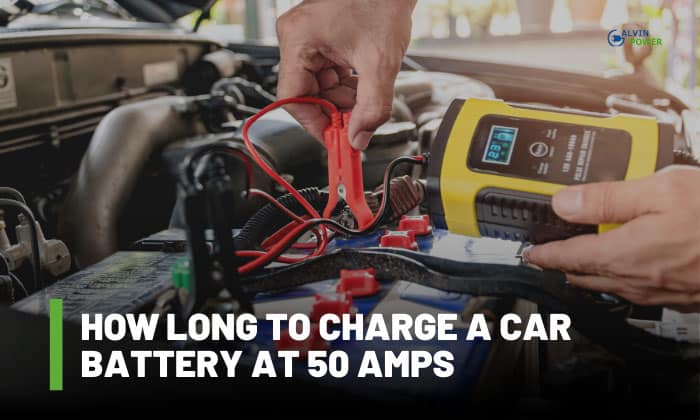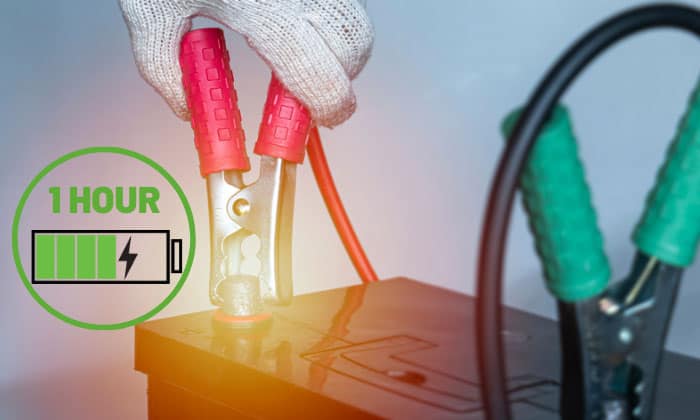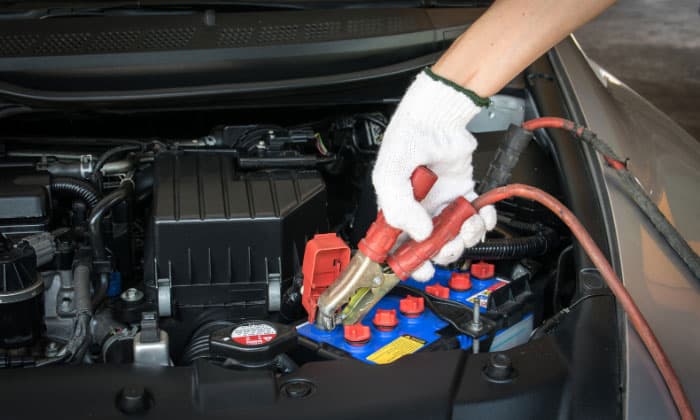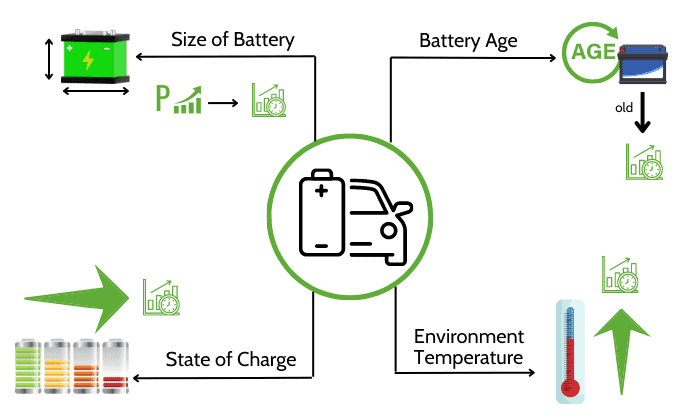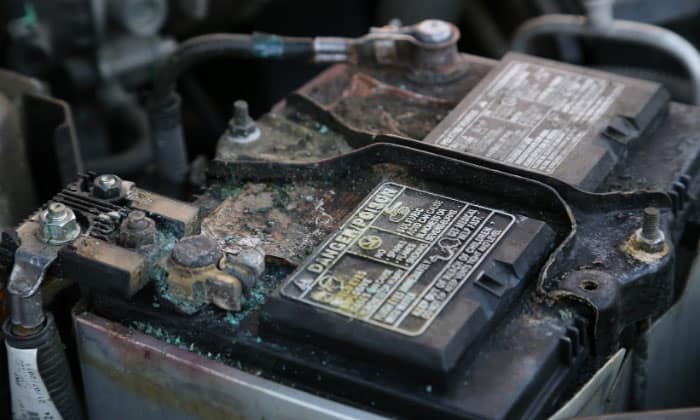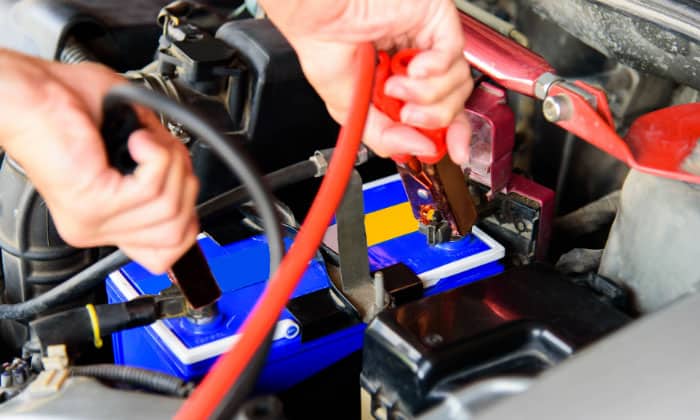To use old car batteries that lost some of their power, charging is often the go-to solution. In this case, you might wonder how long to charge a car battery at 50 amps.
Typically, a battery charged with a 50-amp charger can reach full capacity in about an hour. However, several factors can impact the charging time, which may result in longer durations. Let’s dive into these factors and gain some knowledge to ensure your battery remains healthy.
Table of Contents
How Long to Fully Charge a Car Battery Using a 50 Amp Charger?
A battery powers the electronic components of every car, making it one of the most crucial components. It is essential to keep the battery fully charged, especially while starting an engine. It may be difficult for the engine to work, and the electronic components may not function if the battery is empty or has a low charge.
Therefore, charging is the primary remedy when a battery reaches a low energy level or runs out of power. When charging a battery, it is important to know your car battery charger time to avoid damaging it by plugging it in for too long.
Usually, powering a car battery using an average 6 amp charger may take a night. At the same time, using a device with a higher charging rate may dramatically reduce this waiting period to a few hours.
In general, a 50 amp battery charger works much faster than similar options with lower ratings.
An hour is enough to charge a 12V battery with 50 Ah capacity. Nevertheless, this given time may change due to some factors that affect the charging time.
It’s essential to keep in mind that utilizing a powerful charger increases the chance of overcharging, which could harm or shorten the life of your battery. Therefore, it is essential that you understand the factors affecting this process and take the required safety precautions.
To understand all these factors and how they affect the charging time, let’s discuss it further below.
Time to Charge a Car Battery at Other Amps
If a 50-amp charger can charge a 50 Ah battery within 1 hour, how about with 12 volt charger that comes in other ratings? Here’s a quick guide that you can use as a reference.
- At 8 amps, you can fully charge a car battery within six hours. However, below this rating, it can take up to more than a day, especially at 2 amps or 1 amp of charging rate.
- 5 hours at 10 amps
- 5 hours at 20 amps
- 6 hours at 30 amps
- 2 hours at 40 amps.
Pro Tip: When using a charger with less than 20 amps, it is advisable to check the battery every hour, and for 50-amp chargers, at least every 20 minutes. This measure ensures there are no issues that could damage the battery.
Factors Affecting Time to Charge a Battery
In addition to the various charger rates, the following variables may have an impact on how quickly a car battery gets back to being full.
1. Size of Battery
The charging time may vary depending on the battery size. A bigger capacity typically means more time to recharge a car battery.
2. Battery Age
The battery’s capacity to store a charge declines with age. As a result, charging an older battery could take longer than charging a new one.
3. State of Charge
The battery’s level of charge also has an impact on how long it takes to reach 100% capacity. It will take longer to charge a dead car battery than one that still has some power.
4. Environment Temperature
The surrounding area’s temperature can also impact how quickly a battery charges. The majority of the time, a cooler environment will require more time to charge than a warm one.
What Happens if a Car Battery Overcharges?
A car battery that has been overcharged may lead to several issues. It can have a shorter battery life, die entirely, and even cause explosion or fire risks.
When a battery gets overcharged, the electrolyte fluid inside it boils due to the extra energy. As a result, it may damage the internal part of the battery and lose its capability to hold energy. In the worst cases, this results in a completely dead battery.
Additionally, overcharging can also cause the battery to release hydrogen gas, which can be hazardous and potentially explosive in confined spaces.
Frequently Asked Questions
What is the Best Amperage to Charge Car Battery?
Even though it takes a lot of time to charge a car battery with a lower amp charger, it is much safer than a higher charger level. In most cases, it is advisable to use up to 7.5 amps, as it is less likely to cause harm to the battery.
How Fast is a 50 Amp Charger?
A 50-amp charger is a fast charger that can provide 50 amps in just an hour of charging. However, it is not advisable to use chargers with a higher rating, such as 60 amps or more, to power a standard car battery because it may cause damage to the unit.
How Long Will a 50 Amp Hour Battery Last?
The longevity of a 50-amp hour battery is determined by its usage and discharge rate. The battery may last roughly 50 hours if it continuously discharges at 1 amp. However, the battery could not last as long if the discharge rate is higher.
How Long to Charge a Car Battery While Driving?
Charging a car battery while traveling is possible, but do not expect your battery to reach full power. On average, charging a battery may take up to eight hours of driving on a highway.
Can I Charge My Battery Using a Jumper Cable?
Even though it is possible to charge a battery with jumper cables, it can cause harm to the battery and the car’s electrical system. In this case, an appropriate battery charger is best to prevent any hazards.
Conclusion
In order to avoid damage that could result from overcharging, it is critical to understand how long to charge a car battery at 50 amps. However, it is also essential to understand that the actual charging time may change based on various variables.
In general, a 50-amp charger can offer a quick and effective way to power batteries. Nevertheless, using this charger requires constant attention to detail and caution.

I am Edwin Jones, in charge of designing content for Galvinpower. I aspire to use my experiences in marketing to create reliable and necessary information to help our readers. It has been fun to work with Andrew and apply his incredible knowledge to our content.

